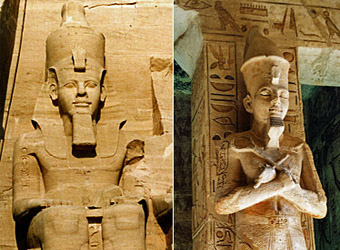Egypt’s antiquities minister is asking the Obama administration to impose emergency restrictions on the importing of ancient artifacts from his country, saying that the looting and smuggling of such treasures has been “catastrophic” since the Arab Spring revolt of 2011.
In a meeting on Tuesday at the State Department, the minister, Mohamed Ibrahim Ali, pushed for fast action on the restrictions, a measure that the United States can take only after a nation submits a complex formal proposal. The State Department said that it was open to such a request.
The restrictions would allow Immigration and Customs Enforcement agents to seize Egyptian cultural artifacts entering the United States if they lacked official documentation that they had lawfully left Egypt. Customs officials have no authority now to seize Egyptian items unless they have specific information or a strong suspicion that they were stolen. Negotiated restrictions would give greater latitude.
Customs agents already have broader powers to inspect and confiscate imported cultural artifacts from 16 other nations, 15 of which have signed agreements under a 1983 law, the Convention on Cultural Property Implementation Act. Iraq, the 16th, is included because of the looting that took place during the United States invasion.
Dr. Ali said his government would seek a long-term agreement with Washington, specifying what kinds of objects to restrict. But in the short term, he said, the situation was too critical to wait the many months, if not years, that such negotiations generally require. “We don’t have the luxury to wait a long time while our history is being stolen and sold here in the United States,” Dr. Ali said in an interview on Wednesday.
It is difficult to gauge with any precision how much looting has swept Egypt since the fall of President Hosni Mubarak in 2011. But American and Egyptian specialists say pillaging has increased significantly as looters, using bulldozers, shovels or simply their hands — and often defended by armed men — have ransacked known excavations, as well as ancient tracts set aside by the government for future exploration. Before-and-after satellite images of important sites show pockmarked landscapes that one expert likened to “giant slices of Swiss cheese.”
Dr. Ali met with the State Department’s assistant secretary for Near Eastern affairs, Anne Patterson, and the assistant secretary for education and cultural affairs, Evan Ryan, to discuss the request. In a statement on Friday, the department said, “We stand ready to work with Egypt, and any other government, on preserving cultural heritage, and look forward to Egypt submitting a formal request for a bilateral cultural property agreement.”
To receive emergency restrictions, a country has to put together a formal proposal that documents, among other things, that there is actual risk and damage to its cultural heritage sites. It also must assemble a list of the kinds of objects it wants blocked and lay out plans for internal policing.
Dr. Ali said hundreds of undocumented archaeological objects, likely stolen by “cultural racketeers” since 2011, have turned up for sale in the United States on Internet auction sites and in art galleries.
A wide-ranging group of experts who support Egypt’s bid for restrictions, among them historians, archaeologists, cultural heritage lawyers and security consultants, met with Dr. Ali at his embassy on Wednesday to discuss Egypt’s plight. Several of them, members of the Antiquities Coalition, a research group, said there was no question that stolen Egyptian relics are appearing for sale on websites and in dealers’ catalogs in the United States.
Dr. Ali praised eBay for removing hundreds of items put up for bid since 2011. The auction site agreed to do so, he said, after Egyptian experts obtained several of the objects and determined through testing that they were authentic, undocumented artifacts.
In the interview, Dr. Ali painted a bleak picture of the state of Egyptian archaeological sites and the inability of the government to protect them. He said some looting is by organized syndicates that methodically raid known locations, while other thefts are by villagers who dig through unexplored areas in an attempt to earn a few dollars on the illicit market.
“There was a breakdown of the police forces, and everybody started digging, and we lack the ability to stop them now,” he said.
The Capital Archaeological Institute at George Washington University, which supports Egypt’s call for restrictions, has put together a new group called the International Coalition to Protect Egyptian Antiquities. Even without government action here, the group hopes to persuade American auction houses, art dealers and individuals to agree to halt the sales of any Egyptian antiquities that did not leave Egypt with a government stamp of approval.
They urged them to follow the lead of eBay and Christie’s. In May, Christie’s halted the London sale of Egyptian artifacts put up for auction by a man who claimed he had inherited them, after experts from the British Museum concluded that they had been stolen after the 2011 revolt.
Dr. Ali said his government would have an easier time recovering the many items stolen from Egyptian museums in recent years because such pieces had been inventoried and are identifiable. He described the United States as the biggest market in the world for Egyptian antiquities and said he hoped an effort by Washington to curb imports would persuade other countries to follow suit.
Source: The New York Times



